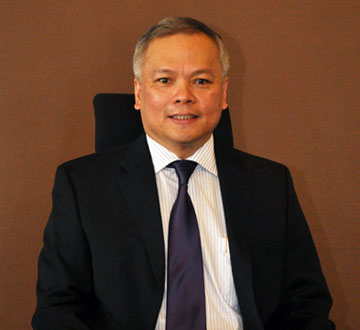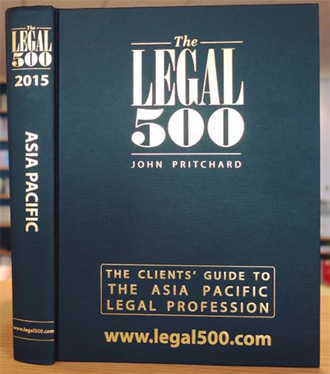About HTCC Law Offices
Hipolito Tuazon Cruz and Chipeco Law Offices is based in Angeles City and one of the largest law firms in Central Luzon (Region III), Philippines.
Its office location is at Ground Floor, Angeles Business Center, Nepo Center, Angeles City, with satellite office at Third Level, Marquee Mall, Angeles City, and a correspondent office at 2/F Chipeco Bldg., Shaw Blvd., Corner Meralco Avenue, Brgy. San Antonio, Ortigas Center, Pasig City.
The firm offers a broad and integrated range of legal services that covers such areas as litigation and arbitration, labor and immigration, banking and finance, investments, mergers and acquisitions, corporate, taxation, real estate, and family relations.

ELFREN P. HIPOLITO, JR., is a senior partner in HTV Law. In his employment law practice, Atty. Hipolito focuses on employment litigation defense, illegal dismissal actions, unfair labor practice actions, and other employment-related lawsuits. He also provides advice on a wide range of employment and labor laws compliance with these laws.

MARIA IMELDA Q. TUAZON, has worked on a number of litigation cases for various clients from different industries. These cases include those involving intellectual property and family law

HAZEL B. PANTIG-CRUZ, is a partner and her practice focuses on litigation, immigration, labor, taxation, securities and family law.
2023 PH Overview
The economy in the Philippines is vibrant with a growing appetite to increase outbound and domestic investments. The country is keen to continue to upgrade its technology, telecoms and digital infrastructure to pave the way for more foreign investments. In the aftermath of the Covid-19 pandemic, the economy is bouncing back and the tourism industry is making a good recovery. The perception is that the Philippines has one of Asia’s fastest growing economies and it is being seen as a dynamic hub for international business expansion and investment.
Firms are increasingly advising on renewable energy projects such as solar, wind and geothermal energy sources. Also, there continues to be more cross-border M&A work. Capital markets has been quieter of late due to global economic conditions, but there are deals in the pipeline. Firms who specialize in commercial disputes have been kept busy, as there have been more cases involving investor and partnership disputes. (The Legal 500) .
2021- 2022 PH Overview
With the Covid-19 pandemic still ongoing in much of Southeast Asia, the Philippines had held to adapt to the “new normal” in both everyday life and regulatory terms. Due to travel restrictions, visa applications dropped off and immigration practices were particularly hard hit. However, a revision of government guidelines now allows foreign nationals to apply for the 9(g)-work visa and 47(a)2 work visa whilst still abroad instead of in-country, streamlining the process, In light of these developments, firms are predicting an increase in work visa applications from multinational clients.
Firms specializing in technology-related sectors have fared better. As around 71% of the adult population in the Philippines is unbanked, fintech and decentralized digital banking companies have taken the market by storm. Regulatory policies are reflective of the fintech boom; Philippine authorities have adopted a regulatory sandbox approach to provide businesses in the financial sector with a controlled but dynamic environment to innovate novel ideas, products and services. As a result, forms have been increasingly solicited for their regulatory and compliance services. International firms are particularly active on the capital and debt markets front with Milbank and Latham & Watkins LLP leading in these areas. (The Legal 500).
2020 PH Overview
Having experienced one of the longest and most severe lockdowns of any country globally, it is inevitable the Philippines has been severely impacted by the Covid-19 pandemic. Court closures, transportation issues, and the suspension of business have led to a slowdown in economic activity and, by extension, the legal market. Immigration work in particular has been severely reduced. New arrivals into the country have almost entirely ceased, and so work is limited to visa renewals and applying for exemptions for executive to come into the country.
On the other hand, much of the work in infrastructure and energy projects continues, the Metro Manila Subway remains on track to be fully operational by 2025, while the already strong interest in renewable energy sources is likely to be boosted by the impending removal of foreign ownership limitations. Outside of projects, the media sector was rocked by the decision not to renew the congressional franchise of ABS- CBN, the largest broadcasting network in the country, thereby forcing it to stop broadcasting. The decision, upheld by the Supreme Court, is likely to substantially affect the sector moving forward. (The Legal 500).
2019 PH Overview
The Philippine government’s ‘Build, Build, Build’ programme has sought to improve poor infrastructure and congested roads in the country.
The business process outsourcing (BPO) sector remains strong in the Philippines, though there are some concerns about the future of the industry in the age of AI and automation. Elsewhere, the mining sector has experienced a downturn, while there has been a renewed interest in renewable energy; positive news for the country, which has traditionally been dependent on coal.
Antitrust is a burgeoning area in the Philippines, following the enactment of the Philippine Competition Act in 2015 and the establishment of the Philippine Competition Commission in 2016. Many law firms in the country are already handling the merger control aspects of corporate transactions, with some also developing notable expertise in anti-competitive conduct and abuse of dominance. (The Legal 500).
2018 PH Overview
The Philippine market has been fairly dynamic in the last couple of years; this is attributable to the change in administration and the enactment of different policies in the infrastructure and projects space. Since Rodrigo Duterte became president in 2016, promising a “war on drugs” and a push towards federalism, he has initiated a “build, build, build” infrastructure program with an emphasis on unsolicited proposals, build-operate-tranfers (BOTs) and public-private partnerships (PPPs), which has led to a flurry of activity in the projects sector. This increase, the need for which is heightened by an expanding population and growing economy, has led to more investor-state and commercial arbitration. The government continues to promote alternative dispute resolution (ADR) as a method of resolving disputes, especially when it comes to BOTs, PPPs and joint ventures.
The business-process outsourcing (BPO) sector remains a strong contributor to the economy and there has been an increase in inbound foreign investment, especially from China, in the corporate and M&A space. Outbound investment from Filipino conglomerates overseas is also increasing. The Tax Reform for Acceleration and Inclusion (TRAIN) Act was implemented in 2018 with the aim of creating a fairer and more efficient tax system; its three key aims are economic growth, employment generation and inflation control. (The Legal 500)
2017 PH Overview
The Philippine electorate made waves in May 2016 by electing Rodrigo Duterte to the presidency. But for all his controversial social policies, there are certainly reasons for investors to be optimistic. The 71-year old President is an avowed enemy of corruption and red tape, and has pledged to support infrastructure and PPP projects. Foreign investors are also showing interest in areas such as education, technology and healthcare, while Philippine corporations, which are growing in size and sophistication, are beginning to invest overseas.
Capital markets activity has been heating up since Duterte’s assumption to office in June 2016. There have been offshore, offerings by Philippine issuers, but most buyers have been Philippine corporations and high-net worth Filipinos. Since Philippine banks are remarkably liquid and willing to lend, foreign banks have no significant presence in the country. However, it has been speculated that domestic banks will soon approach their lending limits.
Following the introduction of a new competition law in July 2015, the Philippine Competition Commission investigated San Miguel Corporation’s sale of its telecom assets to PLDT and Globe telecom, a competition inquiry on a scale unprecedented in the Philippines.
Tax disputes have been a key talking point, largely due to the relatively aggressive approach of the previous tax commissioner, Kim Jacinto-Henarez. Observers anticipate that the number of tax-related disputes should come down under the new commissioner, Cesar Dulay.
Renewable energy, particularly solar and hydroelectric, are becoming prominent staples of the energy sector, although coal is responsible for serving about a third of the country’s energy needs.
The Data Privacy Act, implemented in full in the summer of 2016, will have compliance-related repercussions for clients in the public and private sectors.
The larger domestic firms continue to provide strong service across various practice areas. Although foreign firms are not permitted to establish office in the Philippines, some have associates or member firms in Manila, Cebu and Pampanga. (The Legal 500)
2016 PH Legal Market Overview

A general outlook of optimism continues to surround the Philippine economy. Business Process Outsourcing (BPO) remains an area of growth, and a lucrative source of instructions for lawyers across a number of practice areas. Public Private Partnerships (PPPs) are now being pursued in earnest, and infrastructure projects are demanding the attention of foreign and local firms alike. The enactment of a new law enabling foreign banks to operate in the market is generating interest in this sector.
The legal market has remained relatively stable, with no domestic mergers and few partner moves. A handful of law firms continue to dominate the market. Regulations prevent foreign firms from establishing a physical presence in the Philippines, but some domestic firms have strong links with international firms. (The Legal 500)
2015 PH Legal Market Overview
Areas of Practice

Litigation and Arbitration
Our firm has handled different cases of litigation and arbitration, may it be regarding civil, criminal or commercial. Our firm collaborates with the client for requirements and consultation, and aims to develop an optimal cost-effective strategy.

Labor Law
Our firm collaborates with the client through consultation and assessment of their situation and proceedings. Moreover, our firm assists and advises the clients in formulating and processing labor-related business documents such as manuals and company rules and regulations as well as dispute resolutions. Our firm advises clients on complicated issues as well as litigations emerging from the client’s situation.

Family Relations
Our firm advises, collaborates and represents our clients regarding their civilian rights, freedoms and duties.

Corporate Law
Corporate law is the study of how business and consumer elements interact with one another. Among other services, our firm provides legal counsel, documentation services and requirement assistance. In addition, our firm advises and assists clients in setting up their business in regard to its registration, negotiations and contracts.

Criminal Law
Our firm consults and collaborates with clients to relay their intended course of action and design a strategy. Furthermore, our firm continues to assist and represent our clients throughout the case.

Taxation
Our firm consults and collaborates with clients in assessing and preparing tax-related agendas. Furthermore, our firm assists in the representation of document procurement, related litigations and other taxation issues.

Immigration
Our firm consults and assists in the procurement and process of immigration. In addition, our firm assesses our clients' requirements for a smoother course of action.

Banking and Finance
Banking and Finance are important facets of our firm as Special Economic Zones are within our proximity. Our firm assists and consults clients in document procurement, contracts and other aspects of investing. Also, our firm advises the clients regarding other laws that interrelate with banking and finance.

Land Titles and Conveyance
Our firm collaborates with the client in determining the estate planner’s requisites from the drafting and probate of the estate plan to its implementation, administration and assessment. Our firm employs laws related, but not limited, to property, trusts and taxation for the benefit of the client and his/her relations.

Mergers and Acquisitions
Our firm collaborates and consults our clients in their meetings and transactions for a smoother flow of process. In addition, our firm assists in resolving disputes and laws that interrelate with such agendas.

Notarial and Documentation
Our firm assists, assesses and authenticates documents, licenses and other requirements provided by our clients. Moreover, our firm consults on the procurement and process of requirements.